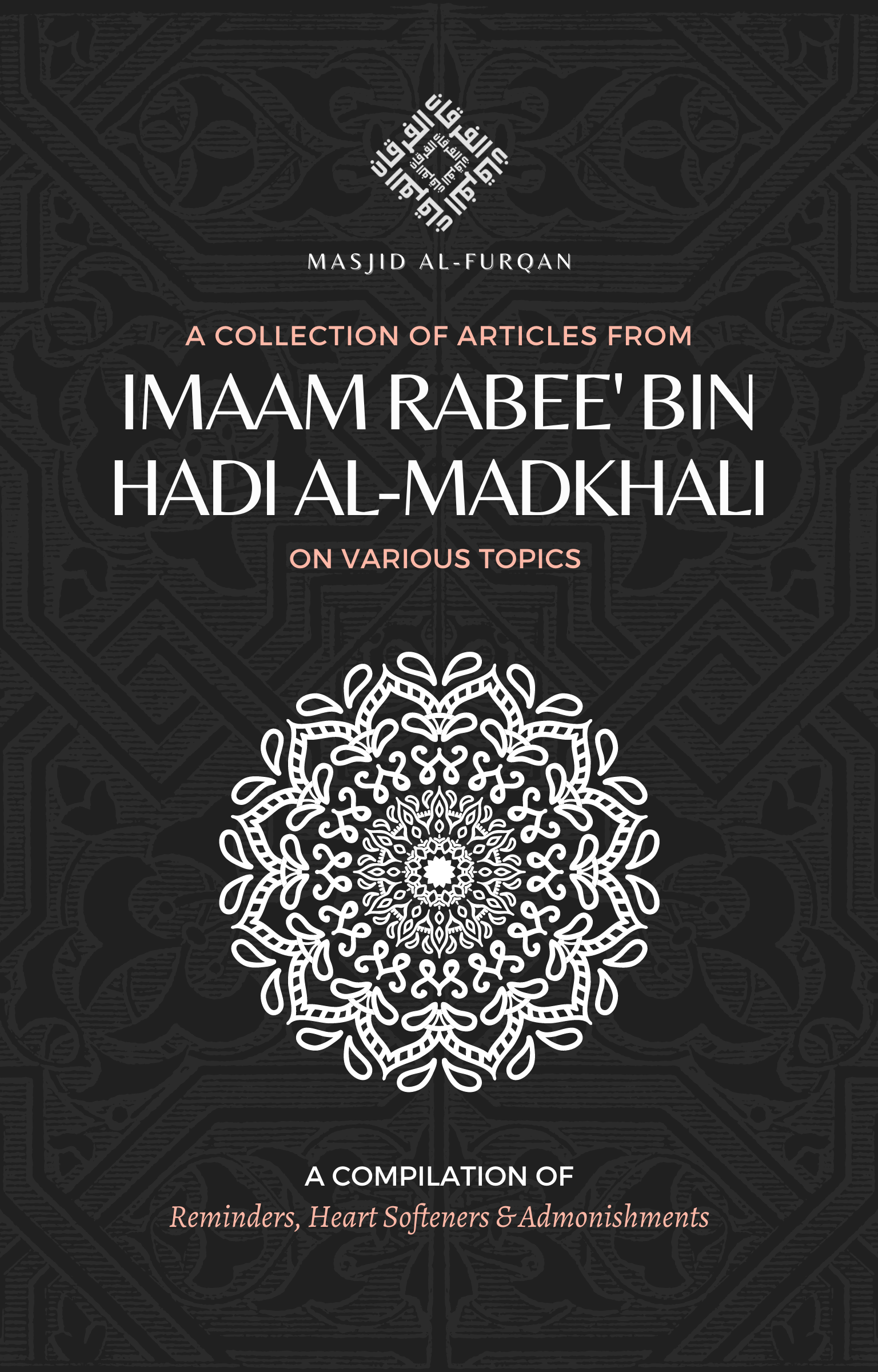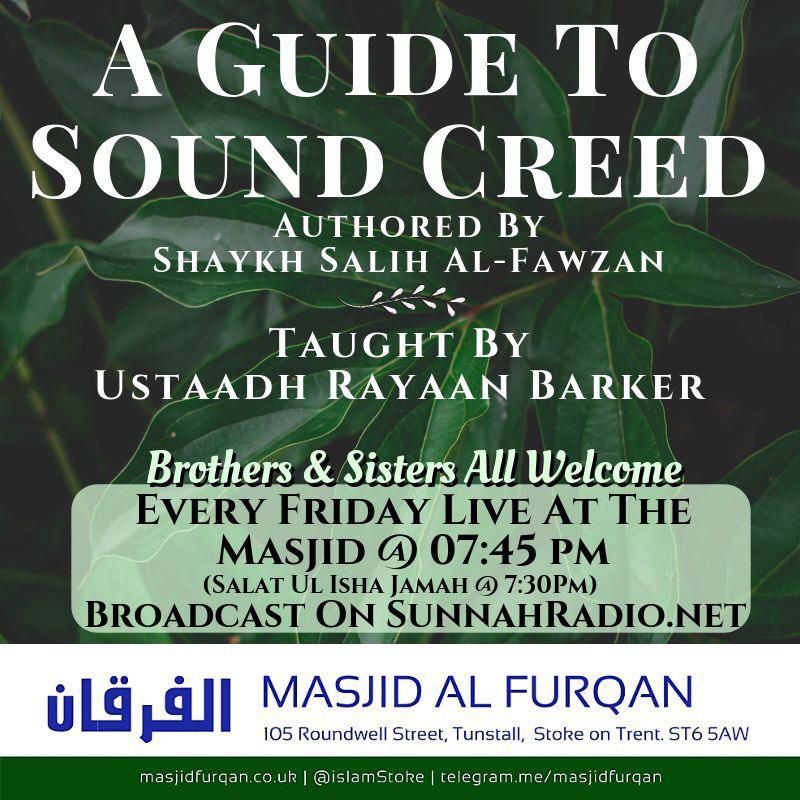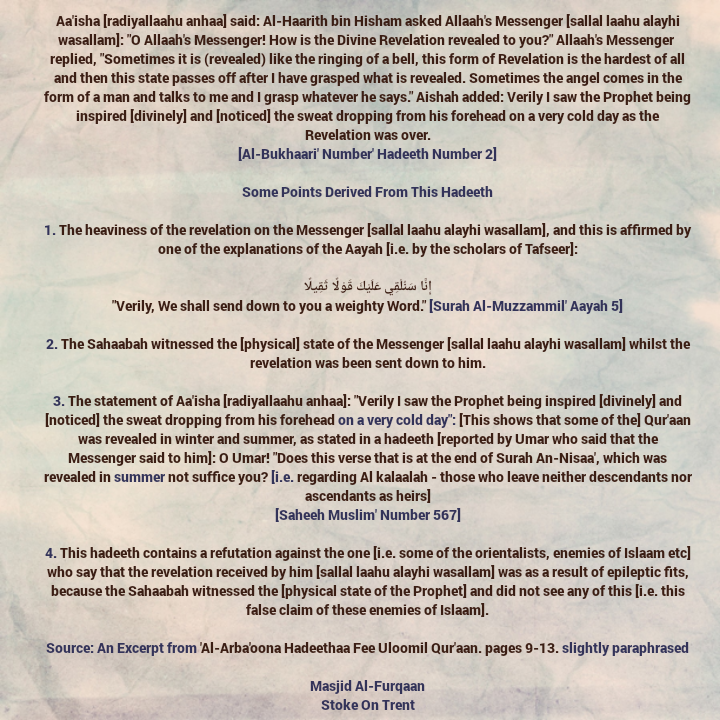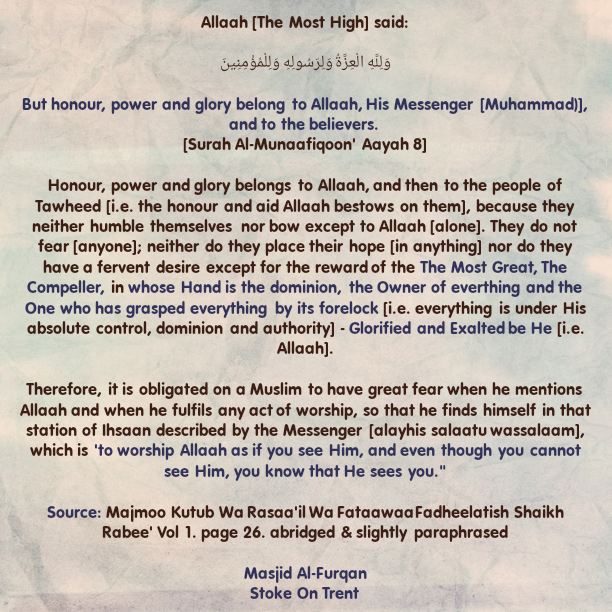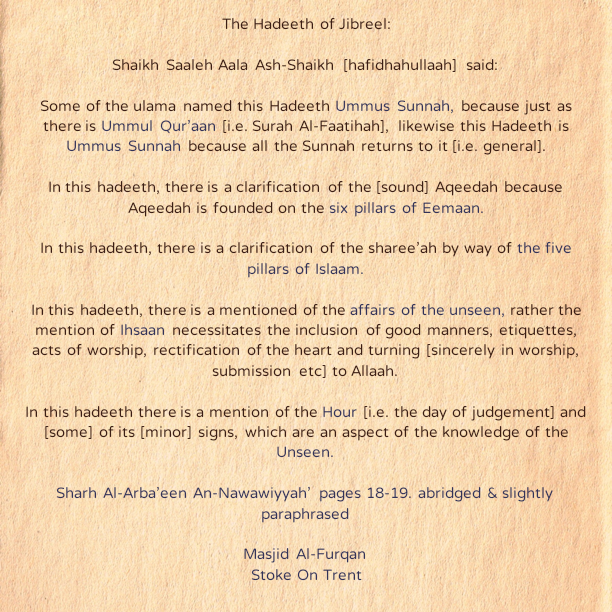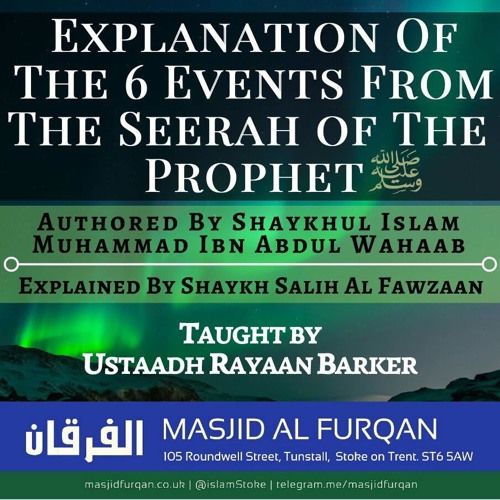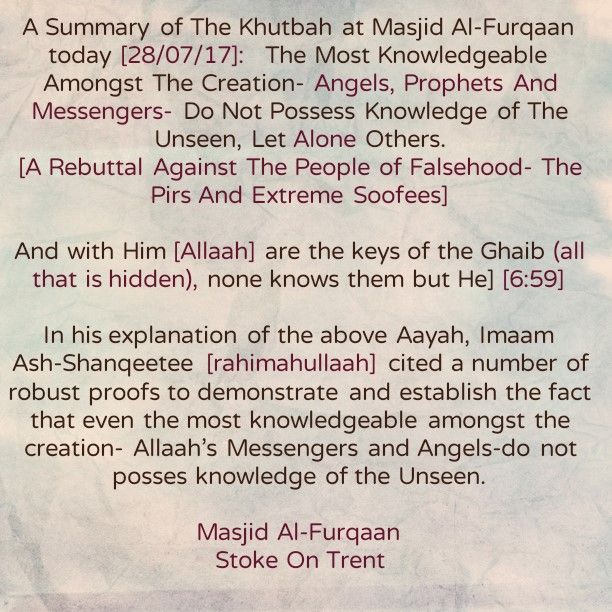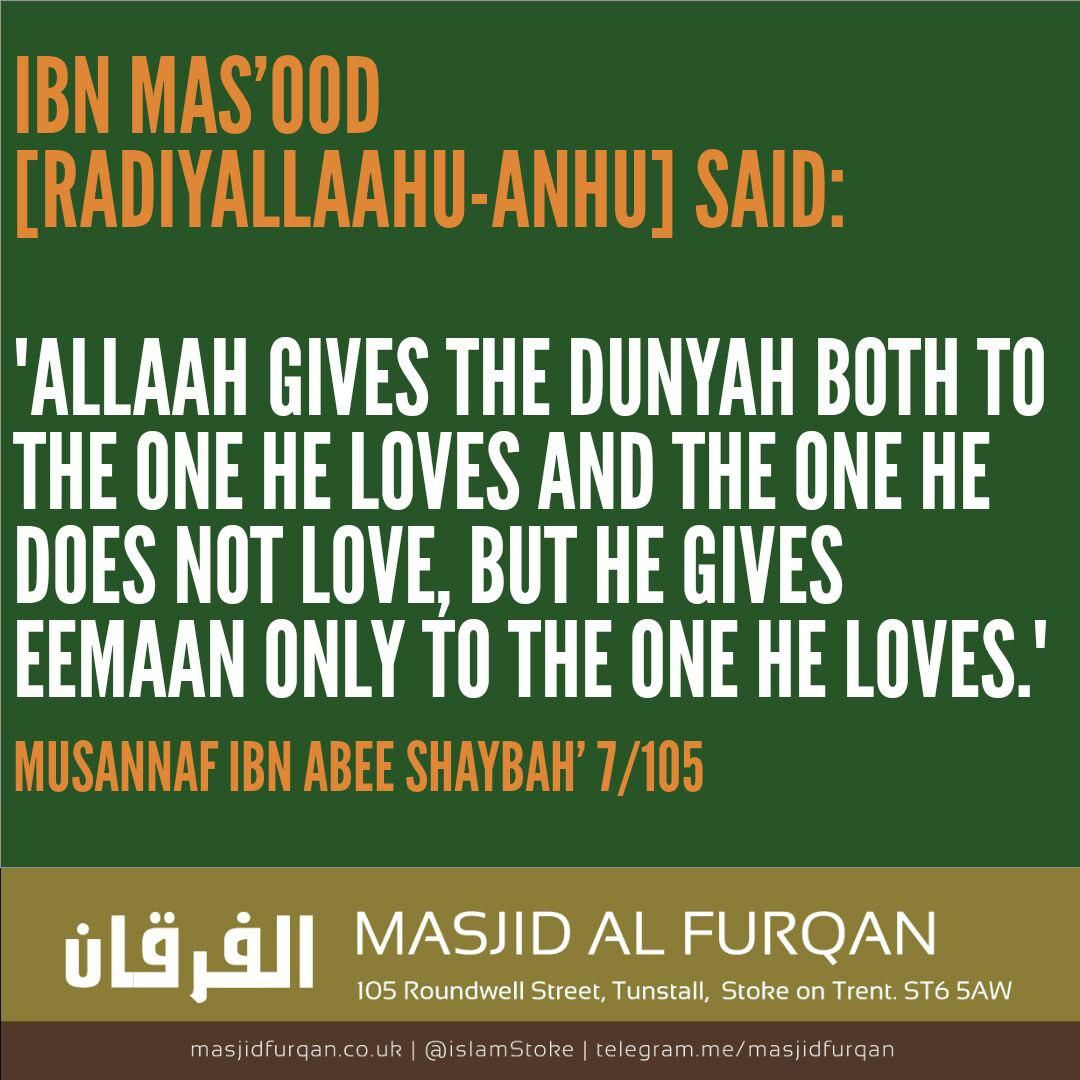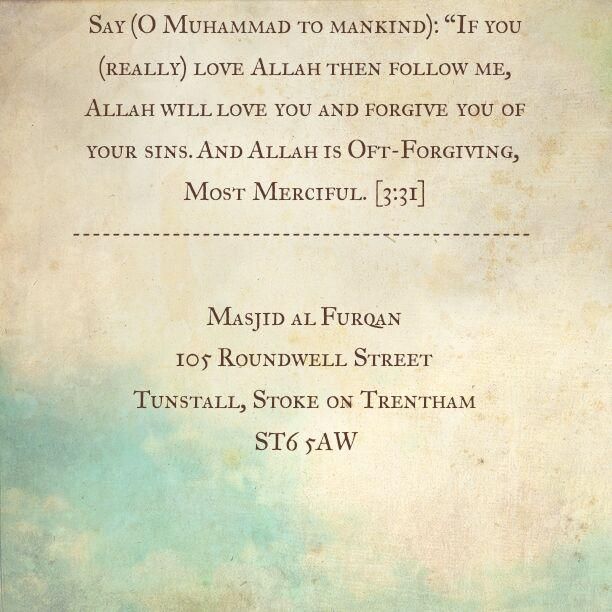Tag: aqeedah
A Guide to Sound Creed – Authored by Shaykh Salih al-Fawzan | Rayaan Barker
Written by Masjid Al Furqan on . Posted in Announcements, Audios, Events, Lessons.

[2] Series: Ahaadeeth Related to Uloom Al-Qur’aan – [Few Fawaa’id Extracted From a Hadeeth Reported By Aa’isha Regarding The Manner In Which The Prophet Used To Receive The Revelation]
Written by Abdullah Jallow on . Posted in Belief - 'Aqeedah', Qur'aan, Scholars of Islam.
“Verily, We shall send down to you a weighty Word.”
________________________________________
One of Reasons The People of Tawheed Are Honoured By Allaah – [A Brief Reminder By Shaikh Rabee (Hafidhahullaah)]
Written by Masjid Al Furqan on . Posted in Belief - 'Aqeedah', Monotheism - Tawheed, Morals and Manners - 'Akhlaaq', Purification of The Soul, Qur'aan, Scholars of Islam, Worship - 'Ibaadah'.
[Surah Al-Munaafiqoon’ Aayah 8]
Ummus Sunnah- [Why Did Some of The Scholars Give The Hadeeth of Gibreel This Name?] – Short Reminder By Shaikh Saaleh Aala Ash-Shaikh [Hafidhahullaah]
Written by Masjid Al Furqan on . Posted in Belief - 'Aqeedah', Calling To Islam - 'Da'wa', Morals and Manners - 'Akhlaaq', Purification of The Soul, Scholars of Islam, Worship - 'Ibaadah'.
Explanation of the 6 Events from the Seerah of the Prophet | Rayaan Barker
Written by Masjid Al Furqan on . Posted in Announcements, Events, Lessons.

A Summary of The Khutbah Today at Masjid Al-Furqaan
Written by Abdullah Jallow on . Posted in Belief - 'Aqeedah', Deviated Callers & Individuals, Deviated Groups, Sects and Parties, Innovations In Islam (Bidah), Khutbah (Friday Sermons), Monotheism - Tawheed, Purification of The Soul, Qur'aan.
In The Name of Allaah, The Most Merciful, The Bestower of Mercy
Allaah [The Most High] said: [وَعِنْدَهُ مَفَاتِحُ الْغَيْبِ لَا يَعْلَمُهَا إِلَّا هُوَ – And with Him are the keys of the Ghaib (all that is hidden), none knows them but He] [6:59]
In his explanation of the above Ayah, Imaam Ash-Shanqeetee [rahimahullaah] cited a number of robust proofs to demonstrate and establish the fact that even the most knowledgeable amongst the creation- Allaah’s Messengers and Angels-do not posses knowledge of the Unseen.
Proof 1: Aa’isha [radiyallaahu-anhaa] was falsely accused and the Prophet [sallal-laahu-alayhi-wasallam] did not know whether she was innocent or not until Allaah [The Most High] informed him, saying: [ أُولَٰئِكَ مُبَرَّءُونَ مِمَّا يَقُولُونَ- Such (good people) are innocent of (each and every) bad statement which they say] [24:26]
Proof 2: Prophet Ibraaheem [alayhis-salaam] slaughtered a lamb for the angels, whilst not knowing that they were angels until they informed him that they were angels. Allaah [The Most High] said that the angels said to Ibraaheem: [إِنَّا أُرْسِلْنَا إِلَىٰ قَوْمِ لُوطٍ – We have been sent against the people of Lout (Lot). (11:70)]
Proof 3: When the angels came to Prophet lut [alayhis-salaam], he did not know that they were angels, and due to that Allaah said: [وَلَمَّا جَآءَتۡ رُسُلُنَا لُوطً۬ا سِىٓءَ بِہِمۡ وَضَاقَ بِہِمۡ ذَرۡعً۬ا وَقَالَ هَـٰذَا يَوۡمٌ عَصِيبٌ۬ – And when Our Messengers came to Lout (Lot), he was grieved on their account and felt himself straitened for them (lest the town people should approach them to commit sodomy with them). He said: Allaah [The Most High] also said that lut [alayhis-salaam] said: [لَوْ أَنَّ لِي بِكُمْ قُوَّةً أَوْ آوِي إِلَىٰ رُكْنٍ شَدِيدٍ – Would that I had strength (men) to overpower you, or that I could betake myself to some powerful support (to resist you). (11:80)].
He did not know what news the angels brought until they said to him: [إِنَّا رُسُلُ رَبِّكَ لَنْ يَصِلُوا إِلَيْكَ – Verily, we are the Messengers from your Lord. They shall not reach you!] [11:81]
Proof 4: Prophet Ya’qoob [alayhis-salaam] lost his eyesight due to grieving for Yusuf [alayhis-salaam], whilst he was in Egypt. He did not know anything about Yusuf until Allaah reveal news about him.
Proof 5: Prophet Sulaymaan [alayhis-salaam], even though Allaah [The Most High] gave him authority over the devils and subjugated the wind in his service, he did not know about the people Bil-Qees until the Hud’hud came with news about them. Allaah [The Most High] said that Hud’hud said: [أَحَطْتُ بِمَا لَمْ تُحِطْ بِهِ وَجِئْتُكَ مِنْ سَبَإٍ بِنَبَإٍ يَقِينٍ – I have grasped (the knowledge of a thing) which you have not grasped and I have come to you from Saba’ (Sheba) with true news] (27:22)]
Proof 6: Prophet Nuh [alayhis-salaam] did not know that his son – who was drowned- was not included amongst those members of his household who were to be saved, as Allaah [The Most High] said that Nuh said: [رَبِّ إِنَّ ابْنِي مِنْ أَهْلِي وَإِنَّ وَعْدَكَ الْحَقُّ – O my Lord! Verily, my son is of my family! And certainly, Your Promise is true.(11:45)]. He did not know the reality of the affair until Allaah informed him, saying: [قَالَ يَـٰنُوحُ إِنَّهُ ۥ لَيۡسَ مِنۡ أَهۡلِكَۖ إِنَّهُ ۥ عَمَلٌ غَيۡرُ صَـٰلِحٍ۬ۖ فَلَا تَسۡـَٔلۡنِ مَا لَيۡسَ لَكَ بِهِۦ عِلۡمٌۖ إِنِّىٓ أَعِظُكَ أَن تَكُونَ مِنَ ٱلۡجَـٰهِلِينَ – He [Allaah] said: “O Nuh (Noah)! Surely, he is not of your family; verily, his work is unrighteous, so ask not of Me that of which you have no knowledge! I admonish you, lest you be one of the ignorant]. [11:46]
And indeed Allaah [The Most High] also stated in Surah Hud about Nuh [alayhis-salaam] that he said to his people: [وَلَا أَقُولُ لَكُمْ عِنْدِي خَزَائِنُ اللَّهِ وَلَا أَعْلَمُ الْغَيْبَ -And I do not say to you that with me are the Treasures of Allah, “Nor that I know the Ghaib (unseen)..] [11:31]
Proof 7: And when Allaah said to the Angels: [أَنۢبِـُٔونِى بِأَسۡمَآءِ هَـٰٓؤُلَآءِ إِن كُنتُمۡ صَـٰدِقِينَ -Tell Me the names of these if you are truthful]; Allaah said that the angels replied: [قَالُوا سُبْحَانَكَ لَا عِلْمَ لَنَا إِلَّا مَا عَلَّمْتَنَا – Glory be to You, we have no knowledge except what you have taught us]. [2:31-32]
Therefore, it is very clear that the most knowledgeable amongst the creation- the Messengers and the Angels- do not know anything of the unseen except what Allaah makes known to them. Allaah [The Most High] informs His Messengers what He wishes from the knowledge of the Unseen, as Allaah stated: [وَمَا كَانَ اللَّهُ لِيُطْلِعَكُمْ عَلَى الْغَيْبِ وَلَٰكِنَّ اللَّهَ يَجْتَبِي مِنْ رُسُلِهِ مَنْ يَشَاءُ ۖ- Nor will Allah disclose to you the secrets of the Ghaib (unseen), but Allah chooses of His Messengers whom He pleases][3:179]
And Allaah said: [عَـٰلِمُ ٱلۡغَيۡبِ فَلَا يُظۡهِرُ عَلَىٰ غَيۡبِهِۦۤ أَحَدًا- (He Alone) the All-Knower of the Gha’ib (unseen), and He reveals to none His Gha’ib (unseen)]; [إِلَّا مَنِ ٱرۡتَضَىٰ مِن رَّسُولٍ۬ -Except to a Messenger (from mankind)…]. [72:26-27]
[Source: Tafseer Al-Qur’aan Bil-Qur’aan Min Adwaa Al-Bayaan’ pages 169-170’ Daar Hady An-Nabawiy’ 2nd ed. (1431AH -2010). Paraphrased and Abridged]
End of quote from Imaam Shanqeetee [rahimahullaah]
Indeed, Allaah does not reveal knowledge of the Unseen to anyone, except to Prophets and Messengers when he wishes to do so. So, if anyone claims that he (or she) knows the future or his (or her) Shaikh knows the future, then remind them of what has been stated in the above article as well as what is stated in the following authentic hadeeth reported by Imaam Al-Bukhaari:
Narrated Abu Hurairah (radiyallaahu-anhu):
The Prophet (ﷺ) said, “When Allah has ordained some affair in the Heaven, the angels beat with their wings in obedience to His statement, which sounds like a chain dragged over a rock.” (`Ali and other sub-narrators said, “The sound reaches them.”) “Until when fear is banished from their (angels) hearts, they (angels) say, ‘What was it that your Lord said? They say, ‘The truth; And He is the Most High, the Most Great.’ (34.23) Then those who gain a hearing by stealing (i.e. devils) will hear Allah’s Statement:– ‘Those who gain a hearing by stealing, (stand one over the other like this). (Sufyan, to illustrate this, spread the fingers of his right hand and placed them one over the other horizontally.) A flame may overtake and burn the eavesdropper before conveying the news to the one below him; or it may not overtake him till he has conveyed it to the one below him, who in his turn, conveys it to the one below him, and so on till they convey the news to the earth. (Or probably Sufyan said, “Till the news reaches the earth.”) Then the news is inspired to a sorcerer who would add a hundred lies to it. His prophecy will prove true (as far as the heavenly news is concerned). The people will say. ‘Didn’t he tell us that on such-and-such a day, such-and-such a thing will happen? We have found that is true because of the true news heard from heaven.” The above hadith is also narrated by Abu Huraira, starting: ‘When Allah has ordained some affair…’) In this narration the word foreteller is added to the word wizard.
[Saheeh Al-Bukhaari’ Hadeeth Number 4701]
Eemaan Is Bestowed Only Upon Those Whom Allah Loves | Ibn Mas’ood (RadiAllahu Anhu)
Written by Masjid Al Furqan on . Posted in Articles, Belief - 'Aqeedah', Monotheism - Tawheed, Purification of The Soul, Scholars of Islam, Seeking Knowledge, The Salaf - Pious Predecessors.
Ibn Mas’ood [radiyallaahu-anhu] said:
“Allaah gives the Dunyah both to the one He loves and the one He does not love, but He gives Eemaan only to the one He loves.”
[Musannaf Ibn Abee Shaybah’ 7/105]
A Test for all of Us – [If You Really Love Allaah, Then Follow the Messenger’s Sunnah]
Written by Abdullah Jallow on . Posted in Belief - 'Aqeedah', Calling To Islam - 'Da'wa', Qur'aan, Scholars of Islam, Worship - 'Ibaadah'.
In The Name of Allaah, The Most Merciful, The Bestower of Mercy
Allaah [The Most High] said in Surah Aali Imraan Ayah 31:
[قُلۡ إِن كُنتُمۡ تُحِبُّونَ ٱللَّهَ فَٱتَّبِعُونِى يُحۡبِبۡكُمُ ٱللَّهُ وَيَغۡفِرۡ لَكُمۡ ذُنُوبَكُمۡۗ وَٱللَّهُ غَفُورٌ۬ رَّحِيمٌ۬ – Say (O Muhammad to mankind): “If you (really) love Allah then follow me, Allah will love you and forgive you of your sins. And Allah is Oft-Forgiving, Most Merciful];
This Ayah is conveyed to everyone who claims to love Allaah, whilst he [or she] is not one who truly follows Allaah’s Prophet Muhammad [sallal-laahu-alayhi-wasallam]- neither obeys the Prophet’s command nor keeping away from what the Prophet has forbidden. So unless he or she [i.e. the one who claims to love Allaah] truly follows the Messenger, then indeed he [or she] is not truthful in his [or her] claim. [Ref 1]
Allaah [The Most High] also said in Surah Aali Imraan Ayah 32:
[قُلۡ أَطِيعُواْ ٱللَّهَ وَٱلرَّسُولَۖ فَإِن تَوَلَّوۡاْ فَإِنَّ ٱللَّهَ لَا يُحِبُّ ٱلۡكَـٰفِرِينَ – Say (O Muhammad): “Obey Allah and the Messenger (Muhammad).” But if they turn away, then Allah does not like the disbelievers]; Meaning: Say O Messenger [to the people]: Obey Allaah by following His Book [i.e. the Qur’aan], and obey the Messenger by following his Sunnah -whether you were present during his lifetime or present after he has passed away. [Ref 2]
Allaah [The Most High] also said in Surah Al-Hujuraat Aayaat 1 & 2:
[يَا أَيُّهَا الَّذِينَ آمَنُوا لَا تُقَدِّمُوا بَيْنَ يَدَيِ اللَّهِ وَرَسُولِهِ ۖ وَاتَّقُوا اللَّهَ ۚ إِنَّ اللَّهَ سَمِيعٌ عَلِيمٌ – O you who believe! Do not put (yourselves) forward before Allah and His Messenger, and fear Allah. Verily! Allah is All-Hearing, All-Knowing.
[يَا أَيُّهَا الَّذِينَ آمَنُوا لَا تَرْفَعُوا أَصْوَاتَكُمْ فَوْقَ صَوْتِ النَّبِيِّ – O you who believe! Raise not your voices above the voice of the Prophet…]
When it is the case that Allaah forbade [them] from giving precedence to [themselves] over the Messenger, then which type of giving precedence to oneself over the Messenger [sallal-laahu-alayhi-wasallam] can be more severe than giving precedence to one’s intellect over the revelation he was sent with? Many of the Salaf have stated [that this ayah means]: ‘’Neither say anything [about the religion] until the messenger speaks nor act until he commands you.’’
The most disobedient person amongst the people and the most severe with regards to giving precedence to himself [or herself] over the Messenger is that one who gives precedence to his [or her] intellect or the intellect of another person over the revelation the Messenger was sent with. And when it is the case that Allaah has indeed forbidden them from raising their voices above the voice of the Messenger, then how about raising their intellects above the statements of the Messenger and the revelation he came with? [Ref 3]
[Ref 1: (Tafseer Al-Muyassar). Abridged & slightly paraphrased]
[Ref 2: (Tafseer Al-Muyassar). Abridged & slightly paraphrased]
[Ref 3: (Al-Waabil as-Sayyib’ by Imaam Ibnul Qayyim’ page: 21). Abridged & slightly paraphrased]
[1] The Messenger (sallal-laahu-alayhi-wasallam) is from humankind!
Written by Masjid Al Furqan on . Posted in Belief - 'Aqeedah', Calling To Islam - 'Da'wa', Purification of The Soul, Scholars of Islam.
Shaikh Rabee Bin Haadi (may Allaah preserve him) said:
Allaah (The Most High) said:
لَقَدْ مَنَّ اللَّهُ عَلَى الْمُؤْمِنِينَ إِذْ بَعَثَ فِيهِمْ رَسُولًا مِّنْ أَنفُسِهِمْ يَتْلُو عَلَيْهِمْ آيَاتِهِ وَيُزَكِّيهِمْ وَيُعَلِّمُهُمُ الْكِتَابَ وَالْحِكْمَةَ وَإِن كَانُوا مِن قَبْلُ لَفِي ضَلَالٍ مُّبِينٍ
Indeed Allah conferred a great favour on the believers when He sent among them a Messenger (Muhammad) from among themselves, reciting unto them His Verses (the Qur’an), and purifying them (from sins by their following him), and instructing them (in) the Book (the Qur’an) and Al-Hikmah [the wisdom and the Sunnah of the Prophet (i.e. his legal ways, statements, acts of worship, etc.)], while before that they had been in manifest error. [3:164]
The Ayah is a proof that indeed the Messenger (sallal-laahu-alayhi-wasallam) is from the believers.
[1] The Mufassiroon said: The intended meaning of مِّنْ أَنفُسِهِمْ – Among them’ is that he is indeed from the Arabs.
[2] Other (Mufassiroon) said: The intended meaning of (this ayah) is that he [i.e. the Messenger (sallal-laahu-alahi-wasallam)] is a human being.
In the first explanation of the above Ayah, the great favour conferred on them is that they understand the Messenger and he understands them, and they do not require a translator. In the second explanation of the above Ayah, the great favour conferred on them is that they socialize with him just as humans socialize with one another.
———————————————————–
[Source: Adwaa Islaamiyyah Alaa Ba’dil Afkaar Al-Khaati’ah. Page:56-57]
